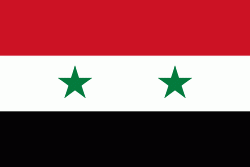Syrian pound
£ or لس
The Syrian pound or lira (الليرة السورية; abbreviation: LS or SP in Latin, ل.س in Arabic, historically also £S, and £Syr; ISO code: SYP) is the currency of Syria. It is issued by the Central Bank of Syria. The pound is nominally divided into 100 piastres (قرش qirsh, plural قروش qurūsh in Arabic, abbreviated to p.), although piastre coins are no longer issued.Before 1947, the Arabic inscription of the word "qirsh" was spelled with the initial Arabic letter غ, after which the word began with ق. Until 1958, banknotes were issued with Arabic on the obverse and French on the reverse. Since 1958, English has been used on the reverses, hence the three different names for this currency. Coins used both Arabic and French until independence, then only Arabic.
During the period when Syria was a part of the Ottoman Empire, which lasted about 400 years, the Ottoman pound was its main currency. Following the fall of the Ottoman Empire and the placing of Syria under a mandate (French occupation), the Egyptian pound was used in the territories under French and British mandates, including Lebanon, Transjordan and Palestine. Upon taking Lebanon and Syria under its separate mandate, the French government sought to replace the Egyptian currency and granted a commercial bank, the Banque de Syrie (a French affiliate of the Ottoman Bank), the authority to issue a currency for territories under its new mandate.
The pound (or livre in French) was introduced in 1919 and was pegged at a value of 20 francs. As the political status of Lebanon evolved, the Banque de Syrie, which was to act as the official bank for Lebanon and Syria, was renamed the Banque de Syrie et du Grand-Liban (BSL). BSL issued the Syro-Lebanese pound for 15 years, starting in 1924. Two years before the expiration of the 15-year period, BSL split the Lebanese-Syrian currency into two separate currencies that could still be used interchangeably in either state. In 1939, the bank was renamed the Banque de Syrie et du Liban.
In 1941, the peg to the French franc was replaced by a peg to sterling of LS 8.83125 = £1 stg, as a consequence of the occupation of Syria by British and Free French forces. This rate was based on the pre-war conversion rate between the franc and Sterling. In 1946, following devaluation of the franc, the pound was pegged once again to the franc at a rate of LS 1 = 54.35 F. In 1947, Syria joined the International Monetary Fund (IMF) and pegged its currency to the U.S. dollar at LS 2.19148 = US$1, a rate which was maintained until 1961. The Lebanese and Syrian currencies split in 1948. From 1961, a series of official exchange rates were in operation, alongside a parallel, black market rate which reflected the true market rate for Syrian pounds in Jordan and Lebanon where there was a healthy trade in the Syrian currency. The market was allowed to flourish because everybody, including government and public sector companies, needed it. The black market rate diverged dramatically from the official rate in the 1980s. In July 2007, the currency was pegged to the IMF SDR (Special Drawing Rights).
Country
-
Syria
Syria (سُورِيَا or سُورِيَة), officially the Syrian Arab Republic (الجمهورية العربية السورية), is a Western Asian country located in the Eastern Mediterranean and the Levant. It is a unitary republic that consists of 14 governorates (subdivisions), and is bordered by the Mediterranean Sea to the west, Turkey to the north, Iraq to the east and southeast, Jordan to the south, and Israel and Lebanon to the southwest. Cyprus lies to the west across the Mediterranean Sea. A country of fertile plains, high mountains, and deserts, Syria is home to diverse ethnic and religious groups, including the majority Syrian Arabs, Kurds, Turkmens, Assyrians, Circassians, Armenians, Albanians, Greeks, and Chechens. Religious groups include Muslims, Christians, Alawites, Druze, and Yazidis. The capital and largest city of Syria is Damascus. Arabs are the largest ethnic group, and Sunni Muslims are the largest religious group. Syria is the only country that is governed by Ba'athists, who advocate Arab socialism and Arab nationalism. Syria is a member of the Non-Aligned Movement.
The name "Syria" historically referred to a wider region, broadly synonymous with the Levant, and known in Arabic as al-Sham. The modern state encompasses the sites of several ancient kingdoms and empires, including the Eblan civilization of the 3rd millennium BC. Aleppo and the capital city Damascus are among the oldest continuously inhabited cities in the world. In the Islamic era, Damascus was the seat of the Umayyad Caliphate and a provincial capital of the Mamluk Sultanate in Egypt. The modern Syrian state was established in the mid-20th century after centuries of Ottoman rule. After a period as a French mandate (1923–1946), the newly-created state represented the largest Arab state to emerge from the formerly Ottoman-ruled Syrian provinces. It gained de jure independence as a democratic parliamentary republic on 24 October 1945 when the Republic of Syria became a founding member of the United Nations, an act which legally ended the former French mandate (although French troops did not leave the country until April 1946).
